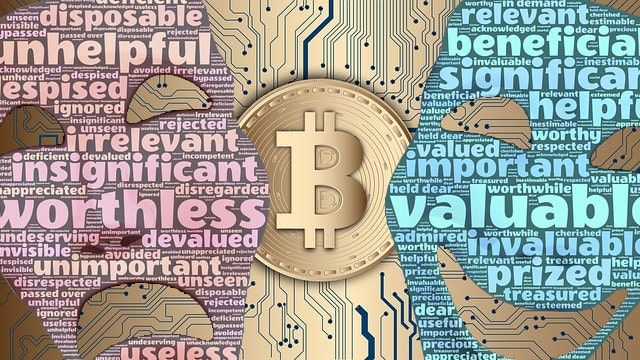Bitcoin and “Intrinsic Value”

What is “intrinsic value”?
Objectively, intrinsic value “is the perceived or calculated value of a company, including tangible and intangible factors, using fundamental analysis. Also called the true value, the intrinsic value may or may not be the same as the current market value.” – investopedia.com
Subjectively, it is an “investor’s perception of the inherent value of an asset, such as a company, stock, option, or real estate.” – Motley Fool
Intrinsic value relates 1) to an asset; 2) its inherent attributes; 3) the owner’s/investor’s perception of value; and 4) can differ from its market value.
Markets are not always efficient and participants are not uniformly rational or perfectly informed. As such, an asset’s intrinsic value does not always equal its market value. Outside of the utility offered today, intrinsic value can be derived from expected future utility. Expected future utility is derived from whether the past can inform future expectations.
Value is a spectrum that knows no absolute and is derived by way of a multivariate equation; it is the culmination of the value that individuals assign to an asset which in turn influences its market price. Because financial markets are a social phenomenon, subjectivity is at play and context matters; what is of value to some may be of little-to-no value to others.
Observing a particular asset at a particular point in time and/or context, an intrinsic value is ascribed. Take for example the value of a diamond, as compared to the value of water. Water is on the whole, more useful for survival, yet diamonds command a higher price in the open market. The value one would ascribe to water, a multi-purpose commodity, can vary depending on its intended use and circumstance. In the correct setting, one would ascribe significantly greater value to water for hydration than its use in agriculture.
However, most areas of the world have an abundance of water, whereas diamonds are said to be “rare”. Rare things have a tendency to be more valuable. Bitcoin they say is also in limited supply, and this supply is programmed to become less available in the future.
Bitcoin’s intrinsic value remains a central topic of debate amongst bitcoin believers and skeptics. To the skeptics, the answer is an unequivocal “zero.” Those skeptics are considered to have imperfect knowledge, a narrow perspective or an old-aged framework that under-represent the capabilities of bitcoin and the idea of “value”.
To the believers, bitcoin’s intrinsic value lies in it being an uncorrelated asset, its intangible properties (immutability, computationally secure, decentralised, etc.), its scarcity, and/or its utility. However, bitcoin holders protest against putting bitcoin into a box, given it various and potentially unlimited uses.
For the skeptics, there may be a need or an obligation to revisit, reconsider, and reconstruct the age-old notion of “intrinsic value”, particularly with the advent of bitcoin.
- Often one derives the intrinsic value of a stock or bond by discounting its future cash flows, dividends, or coupons. For stocks, market participants often use a discounted cash flows (DCF) model and/or the dividend discount model (DDM) to assess the value of future expected cash flows as of today, or their “present value.”
If the price of the security in the open market, or its market value, is less than its intrinsic value, a prudent investor would conclude the security to be undervalued. Although purchasers of bonds calculate intrinsic value by discounting coupons (interest payments), the idea is the same.
- Given that stocks and bonds generate cash flows, the intrinsic value of an asset is viewed by many as the value the asset produces and/or generates. That is, if you purchase a farm, you have ownership of all that it produces, if you purchase a stock, you’re entitled to the business’ cash flows and if you purchase a treasury note, you’re promised interest on top of the principle that you lent out. Bitcoin skeptics claim that because bitcoin does not generate its owners a stream of value, it has no intrinsic value.
Open Source Value
Now, one can hold that a “one-size-fits-all” approach is inherently flawed, but the case could still be made that bitcoin owners are, in fact, entitled to a perpetual stream of value when accounting for bitcoin’s most fundamental property – its open source code.
Because anyone can “fork”, or replicate Bitcoin’s code, purchasers own a claim on newly minted tokens that come to existence when bitcoin is hard forked. This dynamic implies that by owning bitcoin, one is entitled to a perpetual stream of innovation that spawns out of Bitcoin.
 Bitcoin has hard forked 105 times to date, particularly the Bitcoin Cash (BCH) hard fork on August 1st, 2017 that also led to the Bitcoin SV hard fork on November 15th, 2018. Source: forkdrop.io
Bitcoin has hard forked 105 times to date, particularly the Bitcoin Cash (BCH) hard fork on August 1st, 2017 that also led to the Bitcoin SV hard fork on November 15th, 2018. Source: forkdrop.io
It has yet to be seen what relevance forked versions of bitcoin will possess over time and what innovation lies ahead, but there is no denying that by owning bitcoin one is entitled to a valuable stream of innovation that flows back to bitcoin owners as a result of Bitcoin’s open source nature.
For more information, download a free copy of “The Great Debate: Bitcoin & Intrinsic Value”, Kraken Intelligence, September, 2020.







